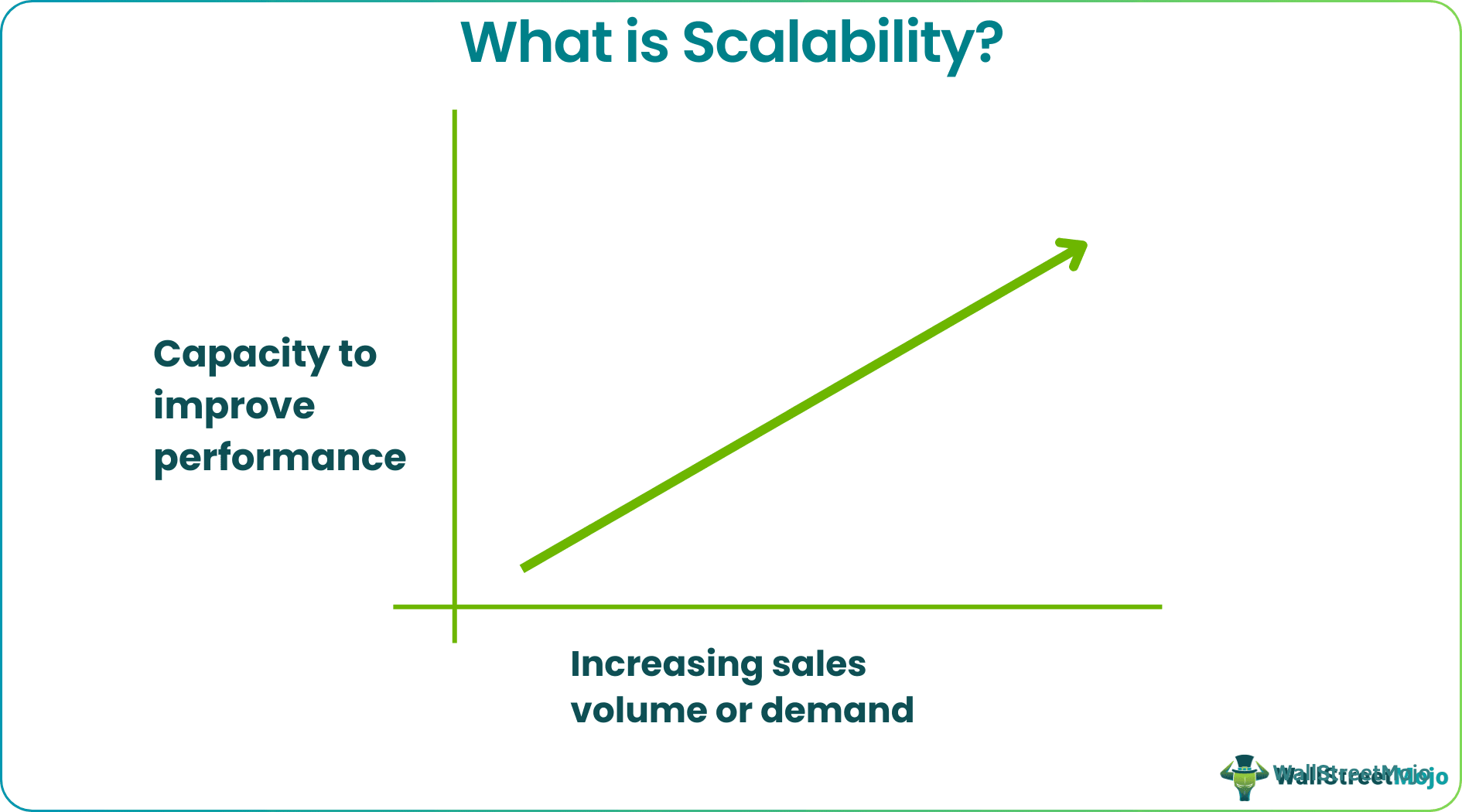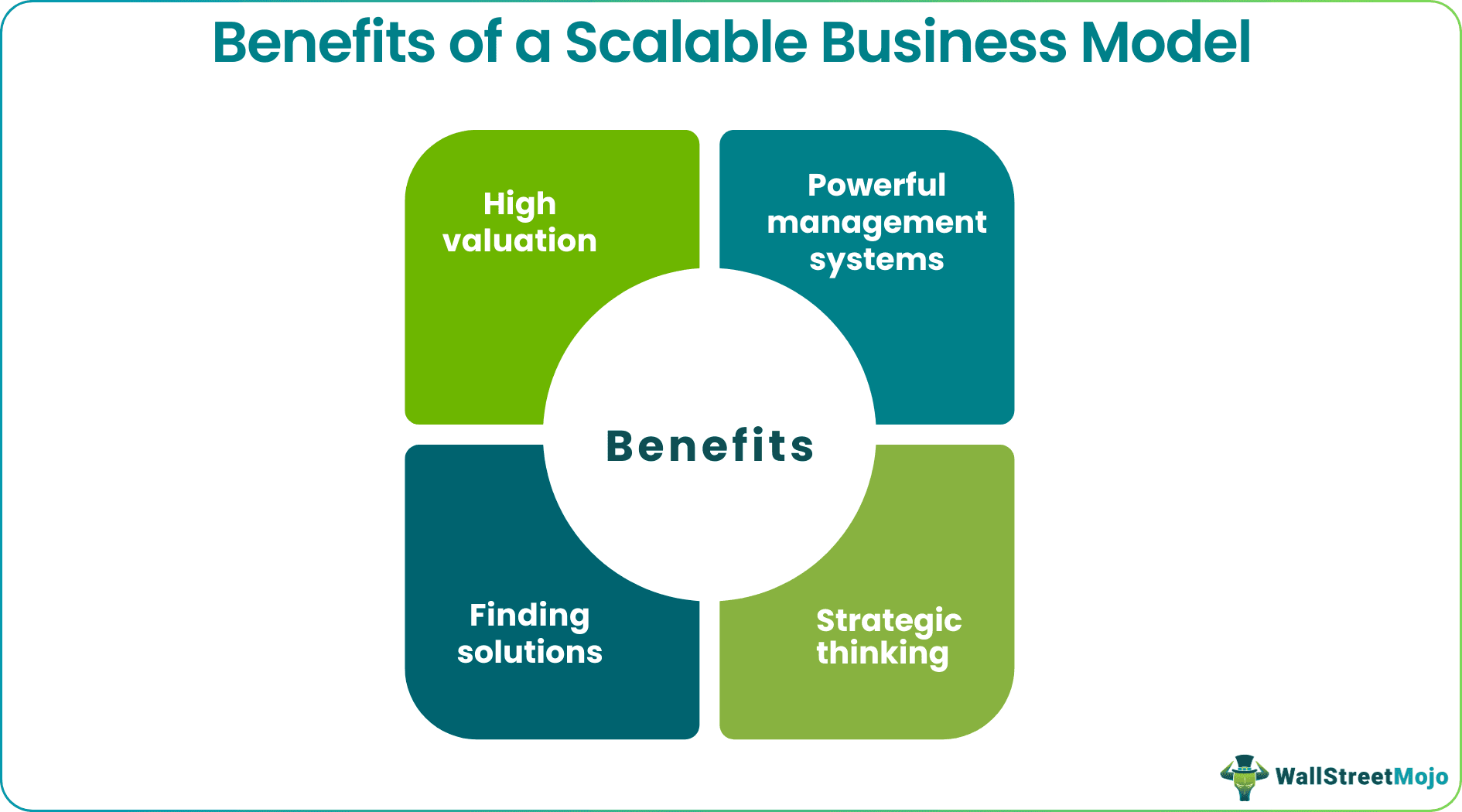Table Of Contents
Scalability Meaning
Scalability in the context of business is an organization's capacity to maintain or improve its performance concerning profitability or efficiency as its sales volume or workload increases. It is the ability of the organization to increase capacity to meet sudden surges in demand.

It shows how well a business can withstand unprecedented situations. Being scalable means being secure about whether or not the organization's business strategy is flexible and can cope with change. A good strategy aligned with the business goals helps predict potential challenges and effectively handle rapid growth without bottlenecks.
Key Takeaways
- Scalability is the ability of a system or business organization to increase capacity to meet sudden increases in demand.
- A scalable strategy matched to the business objectives aids in anticipating future problems and successfully managing rapid expansion without bottlenecks.
- A scalable business model offers many benefits to a business, such as solutions to other problems, power management systems, high valuation, etc.
- A sound strategy aligned with the company's objectives can help anticipate problems and successfully handle rapid expansion without bottlenecks.
Scalability in Business Explained
Scalability in the context of business is the ability to handle high sales volumes. When sales rise, it may become difficult for businesses to retain profitability or efficiency. The type of business that can sustain volume changes without suffering from reduced profitability or efficiency has flexible and scalable systems. It encompasses profitability, efficiency, productivity, and everything else necessary to reach higher standards.
The concept is not restricted to businesses or organizations. Being scalable in a capital market means maintaining high activity levels even when trade and investment activity increase. The scalability of cloud computing involves handling data load and giving the best performance at all times. In addition, the capacity to adjust resources is necessary to accommodate the changing demand.
Businesses must be scalable to effectively handle rapid growth without experiencing bottlenecks. Organizations are frequently compelled to implement various re-structuring techniques when procedural or strategic bottlenecks arise, which may have far-reaching effects. These effects present themselves when running operations that are crucial in attaining organizational objectives. Making a profit is the main motive of any business. However, attaining profitability will only be a surface-level success. To ensure a sustainable business, it should be scalable.
Reducing operating expenses and inventory will increase sales. Continuous improvement centered on eliminating variances throughout process steps enhances the scalable factor. In addition, advanced analytics helps businesses evaluate data to accurately predict customer sentiment and responses, identify opportunities, and plan and allocate resources accordingly. Different fields have different aspects of scaling. For example, cloud computing enterprises should search for platforms and tools that can provide a hybrid cloud in the most useable, consumable, and manageable manner. These are essential in finding a practical way possible to enhance the scalability of cloud computing.
Examples
Check out these examples to get a better idea of business scalability:
Example #1
Jack Trades Pvt. Ltd., a toy manufacturer, recently received a deal where they have to manufacture twice what they normally sell. The company had two choices: recruiting or taking up an additional workload with existing staff. They decided to take up the workload with no additions to the current employees.
The company worked it out by increasing the incentives, compartmentalizing the process similar to assembly line production, and delivering the deal. Had they chosen the first option, they would have barely grown as an organization. Instead, they have scaled the process since they decided to work with the available resources, increasing efficiency and output.
Example #2
Suppose there is a small chain restaurant called "Green Apples" that introduced seafood varieties of dishes to their outlet. The taste was good, and people enjoyed the food. Naturally, the demand rose, and the sales went up. However, the current number of employees they had did not seem adequate.
An obvious choice was to hire a new chef who specializes in seafood. Instead, the management looked into the menu and decided that whatever dish was least ordered would be given the least importance. Instead, that priority would be given to preparing the most demanded dish. With this choice, they could manage higher sales with the available resources.
Benefits
High scalability provides businesses with other benefits besides the apparent increase in profits. They are:
#1 - High Valuation
Companies that have figured out how to increase revenue while decreasing costs are highly appealing to potential buyers. Scalable firms optimize efficiency to increase revenues because buyers desire a profitable business. As a result, scalable firms are more valuable.
#2 - Powerful Management Systems
A business's foundation includes the procedures it has implemented for management. Therefore, a solid management process foundation is essential to maximize growth while minimizing possible negative effects. CRM systems, financial management systems, sales management systems, legal management systems, and operational management systems are a few examples that aid in achieving high scalability.

#3 - Finding Solutions
A scalable business model gets to address questions that can throw light on the prospect of efficiency. These questions include:
- Which products or services have the highest profit margins?
- Which have a chance to experience double-digit growth rates?
- Which products or services are automatable?
- Is there any product that is simple to advertise? Etc.
Finding answers to such questions can lead to the formation of adaptable business solutions.
#4 - Strategic Thinking
Finding excellent human resources and retaining them is part of scaling a business. An efficient business model gives them training in managing daily operations and the authority to carry them out. It also celebrates those with a track record of success in business development. These can contribute to further scaling and profits.
Challenges
While there are lots of benefits to having scalability measures in place in an organization, there are a few challenges that entities may face when they deploy these means of measuring improvements. Here is a list of scalability problems or issues that a business may face:
- Scaling a business too early leads to no significant results. A business must take time for the improvement measures to start working before assessing how impactful they have been.
- Growing and scaling are two different things. While the first signify an increase in the size, productivity, revenue, etc., the latter also focuses on consistency that the brand maintains.
- Scaling measures can be implemented, but which marketing channel is performing better is tough to assess. Hence, businesses have no choice but to continue with whatever networks they have been using.
Every brand has its own essence, In case, the deployed scaling measured lack representation of the brand, the campaign is a failure.
